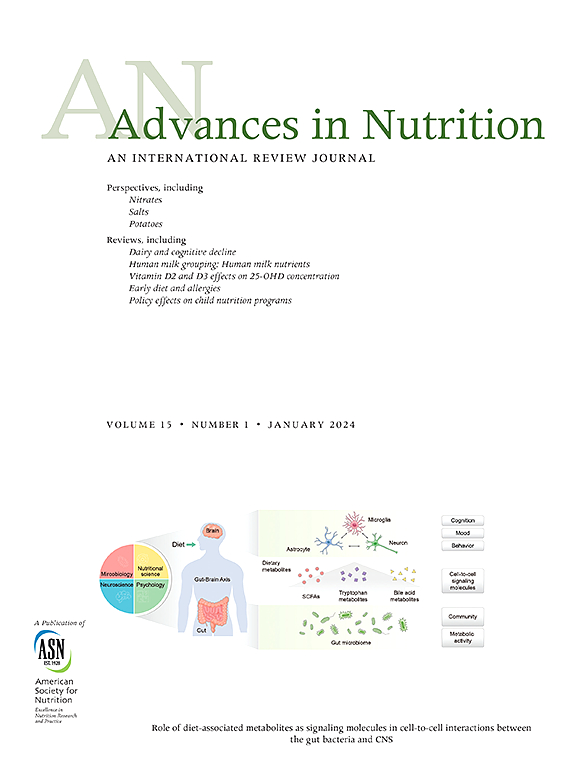Effects of Nut Intake on Gut Microbiome Composition and Gut Function in Adults: A Systematic Review and Meta-analysis
IF 9.2
1区 医学
Q1 NUTRITION & DIETETICS
引用次数: 0
Abstract
The reduced risk of chronic diseases such as cardiovascular disease and type 2 diabetes associated with nut consumption may occur via modulation of the gut microbiota, although this has not been comprehensively assessed. This systematic review of clinical trials aimed to assess the effects of nuts on gut microbiota composition and metabolites, as well astheir effects on gut function and symptoms in adults. The systematic review was conducted following PRISMA guidelines and registered in PROSPERO (CRD42023451282). Outcomes included microbiota diversity, specific bacterial abundances, gastrointestinal symptoms, intestinal permeability, fecal pH, fecal moisture, and short-chain fatty acid (SCFA) concentrations. We performed meta-analyses to assess the overall effect of nuts on fecal moisture, pH, intestinal permeability, and SCFA concentrations. Among the 28 intervention trials included in this review, almonds were the most commonly studied (12 trials), whereas other nuts, such as walnuts, peanuts, pistachios, and Brazil nuts, were also examined. Nineteen articles reported the effects of almond, walnut, peanut, or mixed nuts on the microbiota composition. Additionally, 6 trials used interventions involving a mixture of different nuts. A total of 19 trials assessed the community structure of the gut microbiota by evaluating α-diversity and β-diversity metrics, with most finding no significant differences following the nut intervention. Regarding taxonomic changes, the majority of studies reported no significant changes across nut interventions. However, several studies noted increases in Clostridium and Roseburia species, with mixed results for Bifidobacterium species abundance following almond or walnut intervention. Five studies assessed fecal SCFA concentrations, with positive effects of nut interventions on propionate. There were no effects of nut interventions on fecal pH and intestinal permeability, with an unfavorable effect on fecal moisture. In summary, the available evidence indicates that nuts have modest effect on gut health, but the substantial heterogeneity between studies may hinder further conclusions.
This trial was registered at PROSPERO as CRD42023451282.
坚果摄入对成人肠道微生物组成和肠道功能的影响:一项系统综述和荟萃分析。
食用坚果可通过调节肠道菌群来降低心血管疾病和2型糖尿病等慢性疾病的风险,但这一点尚未得到全面评估。本临床试验的系统综述旨在评估坚果对成人肠道微生物群组成和代谢物的影响。此外,它还研究了坚果对成人肠道功能和症状的影响。系统评价遵循PRISMA指南进行,并在PROSPERO注册(CRD42023451282)。结果包括微生物群多样性、特定细菌丰度、胃肠道症状、肠道通透性、粪便pH值、粪便水分和短链脂肪酸(SCFAs)浓度。我们进行了荟萃分析,以评估坚果对粪便水分、pH值、肠道通透性和SCFA浓度的总体影响。在本综述纳入的28项干预试验中,杏仁是最常被研究的(12项试验),而其他坚果,如核桃、花生、开心果和巴西坚果也被研究。19篇文章报道了杏仁、核桃、花生或混合坚果对微生物群组成的影响。此外,有6项试验使用了不同坚果的混合干预。共有19项试验通过评估α和β多样性指标来评估肠道微生物群的群落结构,大多数试验发现坚果干预后没有显著差异。在分类变化方面,大多数研究报告在坚果干预中没有显著变化。然而,几项研究表明,杏仁或核桃干预后,梭状芽孢杆菌和玫瑰菌数量增加,双歧杆菌数量增加的结果不一。五项研究评估了粪便SCFA浓度,坚果干预对丙酸的积极影响。坚果干预对粪便pH值和肠道通透性没有影响,但对粪便水分有不利影响。总之,现有证据表明坚果对肠道健康有适度的影响,但研究之间的巨大异质性可能会阻碍进一步的结论。注册号:普洛斯彼罗crd42023451282。
本文章由计算机程序翻译,如有差异,请以英文原文为准。
求助全文
约1分钟内获得全文
求助全文
来源期刊

Advances in Nutrition
医学-营养学
CiteScore
17.40
自引率
2.20%
发文量
117
审稿时长
56 days
期刊介绍:
Advances in Nutrition (AN/Adv Nutr) publishes focused reviews on pivotal findings and recent research across all domains relevant to nutritional scientists and biomedical researchers. This encompasses nutrition-related research spanning biochemical, molecular, and genetic studies using experimental animal models, domestic animals, and human subjects. The journal also emphasizes clinical nutrition, epidemiology and public health, and nutrition education. Review articles concentrate on recent progress rather than broad historical developments.
In addition to review articles, AN includes Perspectives, Letters to the Editor, and supplements. Supplement proposals require pre-approval by the editor before submission. The journal features reports and position papers from the American Society for Nutrition, summaries of major government and foundation reports, and Nutrient Information briefs providing crucial details about dietary requirements, food sources, deficiencies, and other essential nutrient information. All submissions with scientific content undergo peer review by the Editors or their designees prior to acceptance for publication.
 求助内容:
求助内容: 应助结果提醒方式:
应助结果提醒方式:


